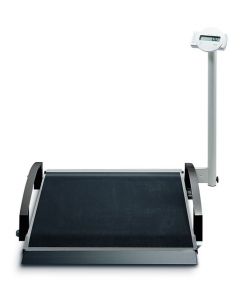In the intricate world of healthcare, precision and accuracy are not just desirable traits but absolute necessities. From monitoring patient health to administering medications, every aspect of medical care hinges on reliable measurements. This is where medical scales play a pivotal role, providing healthcare professionals with precise weight measurements critical for diagnosis, treatment, and patient management.
The Vital Role of Medical Scales:
Medical scales are specialized weighing instruments designed to measure various parameters such as body weight, height, BMI (Body Mass Index), and more. These measurements are fundamental in healthcare settings for several reasons:
Monitoring Patient Health:
Medical scales are used to monitor changes in patient weight, which can be indicative of health conditions, treatment effectiveness, and overall well-being. Regular weight measurements are crucial in managing chronic diseases, assessing nutritional status, and tracking patient progress.
Medication Dosage:
Precise weight measurements are essential for calculating accurate medication dosages, especially in pediatrics and critical care settings where small variations in weight can significantly impact drug efficacy and patient safety.
Diagnostic Purposes:
Medical scales play a role in diagnosing certain health conditions and disorders. For instance, measuring BMI helps assess body composition and identify risks associated with obesity or underweight conditions.
Surgical Planning:
In surgical procedures, accurate weight measurements are essential for anesthesia dosage calculations, surgical planning, and post-operative care.
Types of Medical Scales:
Medical scales come in various types, each catering to specific applications and requirements within healthcare environments:
Wheelchair Scales:
Wheelchair scales are designed to accommodate patients in wheelchairs, these scales have ramps and spacious platforms to ensure easy access and accurate measurements for patients with mobility limitations.
Baby and Pediatric Scales:
Specially designed for infants and young children, baby scales provide precise weight measurements in small increments, crucial for monitoring growth and development.
Floor Scales:
These are standard scales used for weighing ambulatory patients in hospitals, clinics, and doctor's offices. They come in different capacities and configurations to accommodate various patient sizes and needs.
Digital Scales:
Digital scales offer precise and reliable measurements with digital displays for easy reading. They often come with additional features such as tare function, data storage, and connectivity for electronic medical records (EMR) integration.
Users of Medical Scales:
Medical scales are indispensable tools utilized by a wide range of healthcare professionals and facilities:
Hospitals and Clinics:
Medical scales are integral to hospital wards, outpatient clinics, emergency departments, and specialty clinics for routine patient assessments, pre-operative evaluations, and ongoing monitoring of chronic conditions.
Physicians and Nurses:
Physicians, nurses, and other healthcare providers rely on medical scales for accurate weight measurements during patient consultations, physical examinations, medication management, and treatment planning.
Pediatricians and Obstetricians:
Healthcare professionals specializing in pediatrics and obstetrics use baby scales and pediatric scales to monitor growth milestones, assess nutritional status, and ensure healthy development in infants, children, and pregnant women.
Fitness and Wellness Centers:
Medical scales, particularly body composition analyzers, are used in fitness centers, wellness clinics, and sports medicine facilities for assessing body composition, tracking fitness progress, and guiding personalized exercise and nutrition plans.
Home Healthcare Providers:
Home healthcare agencies and providers use portable medical scales for conducting home visits, monitoring patient health remotely, and ensuring continuity of care outside traditional healthcare settings.
Benefits of Using Medical Scales:
The benefits of utilizing medical scales extend beyond accurate weight measurements:
Improved Patient Care:
Precise weight measurements contribute to better patient care by facilitating accurate diagnosis, appropriate treatment planning, and ongoing monitoring of health conditions.
Enhanced Safety:
Accurate medication dosing based on weight measurements reduces the risk of medication errors and adverse drug reactions, improving patient safety and outcomes.
Efficient Workflow:
Medical scales with advanced features such as data storage, EMR integration, and connectivity streamline workflow processes, reduce documentation errors, and enhance efficiency in healthcare settings.
Evidence-Based Practice:
Healthcare professionals rely on accurate weight data from medical scales to make evidence-based decisions, track treatment progress, and evaluate the effectiveness of interventions.
Patient Engagement:
Involving patients in their healthcare by discussing weight measurements, BMI calculations, and body composition analyses fosters patient engagement, promotes health awareness, and encourages proactive management of lifestyle factors.
Conclusion
Medical scales are indispensable tools that play a crucial role in healthcare settings across various disciplines and specialties. From monitoring patient health to guiding treatment decisions, medical scales provide accurate and reliable weight measurements essential for delivering quality care, ensuring patient safety, and promoting optimal health outcomes. Understanding the diverse types of medical scales available and the broad spectrum of users who rely on them underscores their significance in modern healthcare practices.





Comments